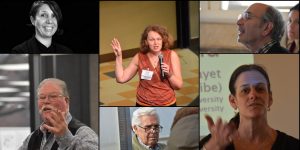 Each year, our COE Think Tank brings together Wes students and faculty from across the university, plus a noted outside scholar, for a yearlong conversation on a topic of vital environmental importance. This year’s focus: how humans relate to and value the non-human part of the world. Learn more about questions our 2018-19 faculty fellows have been pondering this year.
Each year, our COE Think Tank brings together Wes students and faculty from across the university, plus a noted outside scholar, for a yearlong conversation on a topic of vital environmental importance. This year’s focus: how humans relate to and value the non-human part of the world. Learn more about questions our 2018-19 faculty fellows have been pondering this year.
faculty
coe faculty-student grant program supports o’connell’s antarctic research
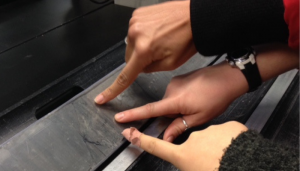 This past January, Nethra Pullela ’20, Liz Atalig ’21, and Jackie Duckett ’20 joined E&ES Professor Suzanne O’Connell on a journey to the center of the earth–traveling to the International Ocean Discovery Program (IODP) at Texas A&M University to collect data and samples for O’Connell’s “Where Was the Antarctic Oligocene Ice?” project, funded by the COE’s Faculty-Student Research Grant Program.
This past January, Nethra Pullela ’20, Liz Atalig ’21, and Jackie Duckett ’20 joined E&ES Professor Suzanne O’Connell on a journey to the center of the earth–traveling to the International Ocean Discovery Program (IODP) at Texas A&M University to collect data and samples for O’Connell’s “Where Was the Antarctic Oligocene Ice?” project, funded by the COE’s Faculty-Student Research Grant Program.
oteiza publishes street theater research
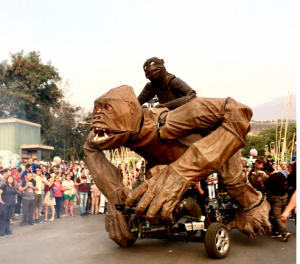 Associate Professor of Theater Marcela Oteiza’s research has just been published in the Journal of Theatre and Performance Design. The article includes text and photos from Wesleyan students who participated in the study abroad winter session 2018– including the photo above, by Jose Luis Sanchez. Street Theatre and the Scenographic Gaze: Santiago a Mil International Festival, January 2018, is available now.
Associate Professor of Theater Marcela Oteiza’s research has just been published in the Journal of Theatre and Performance Design. The article includes text and photos from Wesleyan students who participated in the study abroad winter session 2018– including the photo above, by Jose Luis Sanchez. Street Theatre and the Scenographic Gaze: Santiago a Mil International Festival, January 2018, is available now.
quijada publishes new book
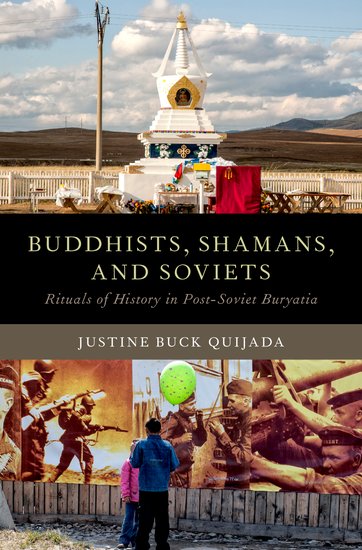 Congrats to Assistant Professor of Religion and COE fellow Justine Quijada, whose new book, Buddhists, Shamans, and Soviets: Rituals of History in Post-Soviet Buryatia, will be published in March by Oxford University Press.
Congrats to Assistant Professor of Religion and COE fellow Justine Quijada, whose new book, Buddhists, Shamans, and Soviets: Rituals of History in Post-Soviet Buryatia, will be published in March by Oxford University Press.
In an early review, Laurel Kendall, chair, division of anthropology at the American Museum of Natural History says, “In Justine Buck Quijada’s thoroughly engaging ethnography of contemporary Buryatia, a miraculously preserved Buddhist corpse counters the artificiality of Lenin’s ‘scientifically preserved’ remains and the body of a Russian Orthodox saint visits the local Cathedral where celebratory bells drown out the drum beats inaugurating a new urban center for shaman practice. Simultaneously inhabiting the chronotypes of multiple historic pasts-indigenous, Buddhist, Russian Orthodox, Soviet-the rituals and celebrations of Quijada’s subjects blur and blend and defy any attempt to effectively categorize them by religion, ethnicity, or nationality politics. The result is a provocative read for anyone interested in these subjects.” –Laurel Kendall, Chair, Division of Anthropology, American Museum of Natural History
Click here to read more about Justine’s work and to watch her presentation, “Is Animism Good to Think With?” from this year’s Where on Earth Are We Going seminar.
wes students, physical plant workers collaborate on performance project
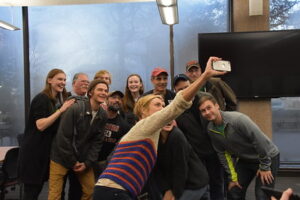 Six students in Barry Chernoff’s ENVS197 (Introduction to Environmental Studies) course worked side-by-side with members of Wesleyan’s Physical Plant this semester, as part of a collaborative project with Forklift Danceworks, an organization that employs performance to activate communities through a collaborative creative process. The Austin-based organization was founded by choreographer Allison Orr, a former Menakka and Essel Bailey ’66 Distinguished Visiting Scholar here at the COE, who lead the project, with help from Forlift’s assistant choreographer Gretchen LaMotte ’18.
Six students in Barry Chernoff’s ENVS197 (Introduction to Environmental Studies) course worked side-by-side with members of Wesleyan’s Physical Plant this semester, as part of a collaborative project with Forklift Danceworks, an organization that employs performance to activate communities through a collaborative creative process. The Austin-based organization was founded by choreographer Allison Orr, a former Menakka and Essel Bailey ’66 Distinguished Visiting Scholar here at the COE, who lead the project, with help from Forlift’s assistant choreographer Gretchen LaMotte ’18.
coe celebrates the schumann institute
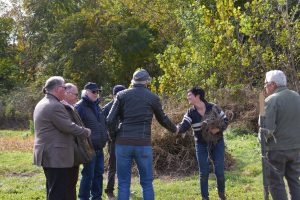 On October 26, 2018, foundation advisors David and Ford Schumann and foundation trustee Timothy Crowley joined COE Director Barry Chernoff, the Robert F. Schumann Professor of Environmental Studies, and Antonio Machado-Allison, the Menakka and Essel Bailey ’66 Distinguished Visiting Scholar in the COE, on a tour of Wesleyan University’s student-run Long Lane Farm.
On October 26, 2018, foundation advisors David and Ford Schumann and foundation trustee Timothy Crowley joined COE Director Barry Chernoff, the Robert F. Schumann Professor of Environmental Studies, and Antonio Machado-Allison, the Menakka and Essel Bailey ’66 Distinguished Visiting Scholar in the COE, on a tour of Wesleyan University’s student-run Long Lane Farm.